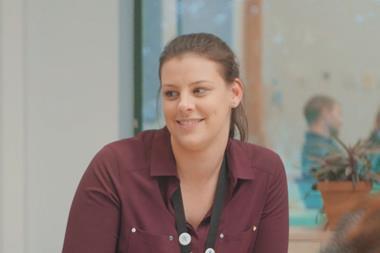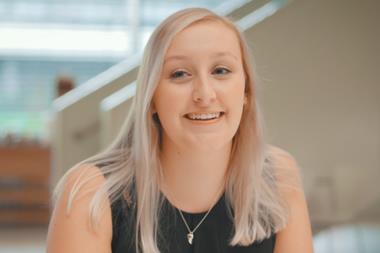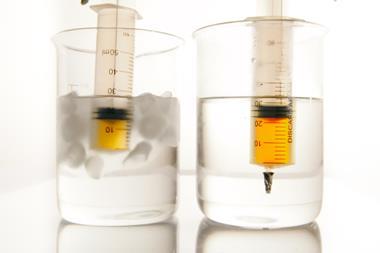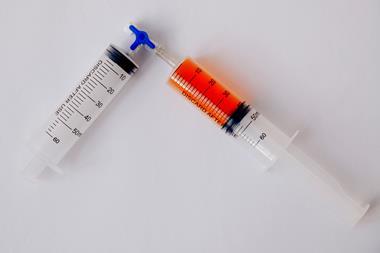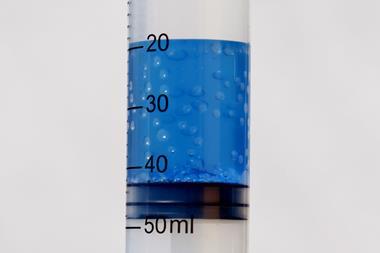Everything you need to know
-
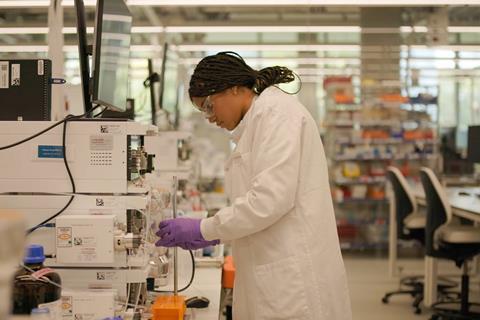
- Salary range: £25–40k
- Minimum qualifications: A-levels and equivalent qualifications
- Skills required: Strong knowledge of organic and biochemistry principles, practical techniques and experience with using instrumentation (eg, spectroscopy and mass spectrometry), data interpretation, problem solving, communication, collaboration.
- Training required: None – you are trained on the job.
- Work–life balance: Dynamic. There are many communities to be a part of.
- Career progression: Continuing to work in the company or branching out to different industries. Further study (master’s or PhD)
- Locations: Find related work experience positions using our map of employers
- Find out more: Explore analytical chemists' roles in more detail.
More profiles like Christina's
What does a peptide chemistry apprentice do?
My job is to make new peptides and improve existing ones so they stay in the body for longer to make a life-changing difference to patients. Peptides are small proteins made from amino acids that are used medically to treat hundreds of conditions including diabetes, cardiovascular diseases and even cancer. I’m typically in the peptide lab synthesising molecules, developing what could become life-changing medicines in the future. Each day is different. Working on different projects, targets and molecules means I’m continually learning and trying new things.
How is your job making the difference?
My work in chemistry enables me to contribute directly to the pharmaceutical industry, helping to develop new treatments for various diseases. The challenge with peptides is they break down quickly in the body. Peptide chemists engineer peptides to last longer in the body by adding linkers and unnatural amino acids. These disguise the peptide so that it can reach the part of the body it needs to treat. For example, there’s exciting work on engineering peptides to carry medicine to specific areas of the body to treat cancer.
Promoting STEM careers, apprenticeships and inclusivity are important to me. I am proud to lead an internal early careers research group with over 1000 members, as well as a part of various other groups. I also lead an innovative and exciting research project to support AstraZeneca’s bold sustainability goals to be net-zero by 2030.
What do you like most about your job?
I love working on cutting-edge medicines that could one day change people’s lives for the better. Connecting with people globally who are like-minded and have an interest in science and making a difference is what encourages me and drives my passion daily. I love that I’m part of the apprentice community, various groups and the community at work.
Who or what inspired you to work in chemical science?
I’ve always had a passion, energy and excitement for science. I did A-levels in chemistry, biology and psychology alongside an Extended Project Qualification (EPQ) in digital medicine. With two parents in the NHS, I was inspired to see the impact you can have by being a healthcare professional. I realised I could impact patients, change lives and the world around me through science.
How did you get into your current role?
I was all set to study a pharmacy degree and had received offers from Russell Group universities. I was unaware that degree apprenticeships existed, where I could combine work and study. One evening I was browsing and saw my current role advertised. I was keen to apply as active learning has always been my style and, during my A-levels, I had already combined studying with working at a supermarket.
When I mentioned ‘apprenticeship,’ especially without a degree in front of it, my teachers, parents, and peers were confused as to why I was looking elsewhere when I had been accepted in top UK universities. My parents had the ‘traditional’ view that university was the only option for success in the world of medicine . However, I went ahead with the application and, at the assessment day, I knew this was the environment that I would excel in. I am studying towards my degree in chemistry and I’m earning a salary and having my university fees paid by my employer.
What barriers did you encounter on your journey into your role?
Initially, it was challenging to branch out and not follow the rest of my peers to university. However, I decided to take the risk and I haven’t looked back. As a degree apprentice, the first-hand experience and professional and personal development in the workplace is invaluable. I am taught and surrounded by experts in the industry who mentor me and help me grow.
How has chemistry opened doors for you?
Chemistry has opened up a world of opportunities for me. It’s allowed me to dive into groundbreaking research – especially in peptide synthesis – which plays a crucial role in drug development. Through chemistry, I’ve been able to collaborate with experts across different fields, making my research more impactful.
My background in chemistry has helped me work on developing and refining new technologies, through making synthesis methods more sustainable. All of this has not only deepened my understanding of the field but also opened doors to entrepreneurial ventures and broader applications of my work.
What advice would you give to a young person thinking of studying chemistry or considering a career in chemical science?
Do it! Chemistry is the forefront of science and is always evolving and changing. It will keep you on your toes and challenge you in many ways, but the best part is that you can change lives and really make a difference with careers in chemistry. There’s so much more out there than I ever imagined.
Christina Dumitriu Jackson, Peptide Chemistry Apprentice at AstraZeneca
Published February 2025








